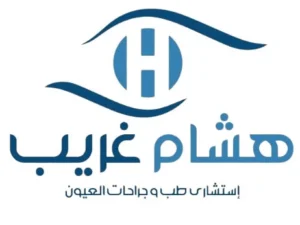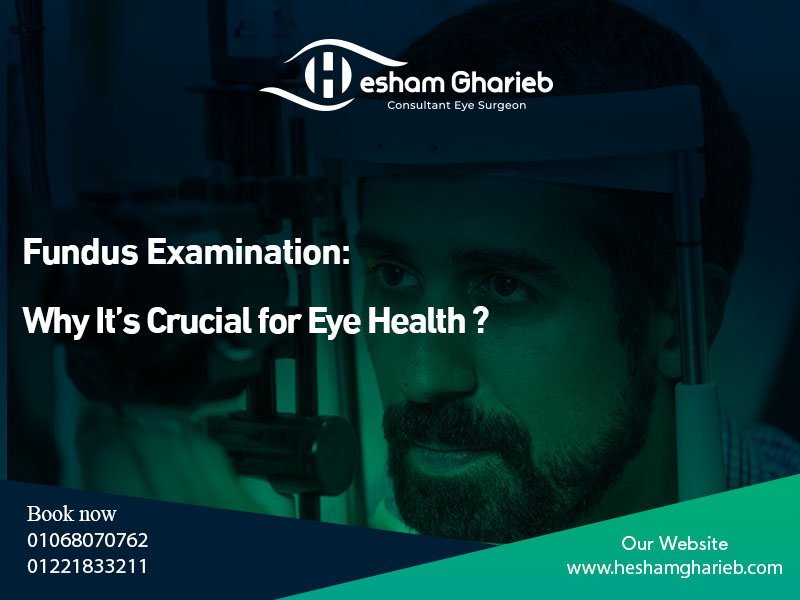Fundus Examination in Egypt : Why It’s Crucial for Eye Health
Have you ever wondered how doctors can detect hidden eye diseases before you even feel any symptoms? The answer often lies in a simple but powerful test — the fundus examination. In Egypt, especially in cities like Cairo and Giza, this test has become a routine yet essential part of comprehensive eye care. Whether you’re managing diabetes, high blood pressure, or simply going for a regular eye checkup, understanding the importance of a fundus exam can help protect your vision for years to come.

What Is a Fundus Examination?
A fundus examination is a test that allows your eye doctor to see the back part of your eye — known as the fundus — which includes the retina, optic nerve, and blood vessels. This area is key to your vision and is often the first place where signs of diseases like diabetic retinopathy, hypertensive retinopathy, or glaucoma appear.
In many cases, doctors use fundus Examination or retinal imaging for a clearer, high-resolution view. Some clinics also perform an OCT test (Optical Coherence Tomography), which provides a detailed scan of your retina’s layers — especially useful for diagnosing subtle retinal or optic nerve changes.
Who Needs It and Why?
Many people think fundus exams are only for the elderly or those with eye problems — but that’s a myth.
You may need a fundus exam if you:
- Have diabetes (even if your vision seems fine)
- Suffer from high blood pressure
- Have blurry vision, sudden floaters, or light flashes
- Have a family history of glaucoma or retinal disorders
- Are over 40 and haven’t had a comprehensive eye exam
- Have been advised to get an OCT test or optic nerve scan
A regular retina check in Cairo or other cities in Egypt can catch conditions early — even before symptoms appear.
How the Procedure Is Done — and Is It Painful?
The exam is quick, safe, and painless.
Here’s how it works:
- Eye Dilation: Your doctor will use special drops to widen your pupils. This may cause light sensitivity or slightly blurry vision for a few hours.
- Visual Inspection or Imaging: Using a special lens or a digital camera, the doctor examines or takes a photograph of the retina.
- OCT (Optional): In many Egyptian clinics, especially those offering full eye screening, an OCT test may also be done. This scan gives detailed cross-sectional images of the retina.
You might feel some discomfort due to the bright lights, but there’s no pain or invasive steps involved.
fundus Examination for Diabetes, Hypertension, and More
This exam is especially important for patients with diabetes. High blood sugar can silently damage tiny blood vessels in the retina, leading to diabetic retinopathy, a leading cause of blindness. Through fundus photography and OCT, doctors can monitor and prevent this complication.
The same goes for people with high blood pressure. Elevated pressure can cause hypertensive changes in the retina, which often go unnoticed until vision is affected.
Getting a regular diabetic eye checkup or high blood pressure eye check in Egypt is a must if you’re managing these chronic conditions.
What Can Be Diagnosed Through It?
A fundus exam can detect:
- Diabetic retinopathy
- Hypertensive retinopathy
- Glaucoma (by observing optic nerve damage)
- Macular degeneration
- Retinal detachment
- Optic neuritis or inflammation
- Retinal vein or artery blockages
- Papilledema (optic disc swelling due to brain pressure)
Whether you’re doing a fundus Examination in Cairo or another city, early diagnosis means early treatment — and better vision outcomes.
OCT Scan: How It Helps Detect Retina Issues
The OCT scan is one of the most advanced retina diagnosis tools used today. It creates a 3D image of the retina, helping the doctor see even tiny areas of swelling or thinning that could indicate macular edema, glaucoma, or retinal holes.
It’s especially useful in:
- Monitoring diabetic eye disease
- Evaluating macular degeneration
- Tracking glaucoma progression
- Planning retinal surgery if needed
Clinics offering OCT tests in Egypt are now more widespread and affordable, especially in specialized eye centers in Cairo and Giza.
Common Questions Patients Ask
Is the exam safe?
Yes. It’s non-invasive and widely used across the world.
Will I be able to drive after the test?
It’s best to avoid driving for a few hours due to pupil dilation.
How often should I do it?
If you have no known condition, once every 1–2 years is enough. Diabetic or hypertensive patients should get checked annually, or as advised by their eye doctor.
What’s the cost of a fundus Examination in Egypt?
It varies based on the clinic and whether you get OCT imaging or not. On average, prices range between 300–700 EGP, with full eye screenings slightly higher.
A fundus examination is more than just a routine eye test — it’s a window into your overall eye health and a powerful tool for detecting serious conditions early.
If you’re in Cairo, Giza, or anywhere in Egypt, don’t wait until symptoms appear. Book your fundus Examination or full eye screening today with an expert like Dr. Hesham Gharib, and take a proactive step in protecting your vision.
Ready to take care of your eyes?
Book your retinal imaging or OCT scan appointment now at one of the best eye exam centers in Cairo.

